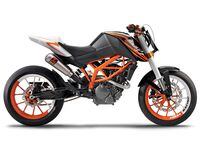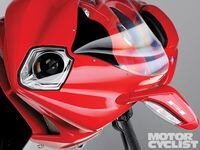Not even high-end European motorcycle manufacturers are immune to the economic downturn. KTM unit sales fell 30 percent and the company lost more than $115 million in 2009, driving the Austrian maker to extend its recently established partnership with India's Bajaj Auto, the world's fourth-largest motorcycle manufacturer. Bajaj now holds a 32 percent equity stake in KTM, and has installed its CEO, Rajiv Bajaj, on its board of directors. An announcement of a new line of 125-300cc streetbikes designed by KTM and built by Bajaj for sale in India, Asia and other emerging markets came shortly thereafter.
This increased investment in KTM came after news that Bajaj had recently explored purchasing both Ducati and Triumph. "All I can say is that Ducati was very expensive," said company chairman Rahul Bajaj. Relations also stalled with Triumph, but not before Triumph's John Bloor visited India and Bajaj officials traveled to the UK. With an 86 percent increase in overall sales in '09 and a 46 percent increase in exports during the month of November-the highest monthly export figure since the company began manufacturing motorcycles in 1959-Bajaj is flush with cash and hungry to expand into new markets.
Coincidentally, Harley-Davidson's search for a buyer for its MV Agusta subsidiary continues-and not incidentally, Bajaj is a prime contender. The Indian company would be able to pay Harley in cash, and with a cleaned-up balance sheet, all-new Brutale and F4 models and a well-developed 675cc F3 triple in the pipeline, MV is an appealing prospect. The Italian rumor mill has also suggested that Ducati might be interested, but MV president Claudio Castiglioni-who sold Ducati to American investment group TPG in '96-is said to be resistant to that scenario. Several Chinese candidates exist as well, though Castiglioni is likewise skeptical of Asian ownership after MV's failed partnership with Malaysian car manufacturer Proton. That venture ended in December '05 with the company being sold back to an Italian bank for just $1.
Given the difficulty of finding a suitable partner for MV, emerging details describing Harley's rejection of a proposed partnership between Buell and Canadian conglomerate Bombardier is all the more puzzling. According to sources at Bombardier's Austrian subsidiary Rotax, the Canadian company first attempted to acquire the design, manufacturing and production rights of the two liquid-cooled, Rotax-powered Buell 1125 models in order to continue manufacturing them under the Can-Am name. After this offer was rejected, it's understood that the Canadians offered to purchase the entire Buell operation outright for an undisclosed figure. The Harley board reportedly rejected this proposal as well.
These revelations have understandably caused consternation among The Motor Company's stockholders, who question why a claimed $125 million was spent to shutter Buell when all (or part) of that expense could have been offset by a deal with Bombardier. Certainly it would have been embarrassing if the Buell-designed bikes had succeeded in building market share under Bombardier ownership-as well might have occurred if the bikes ended up in more appropriate sales outlets. Was the price of preventing that potential embarrassment worth $125 million? Not according to a few hundred unemployed folks in East Troy, Wisconsin, and a few hundred more in Gunskirchen, Austria.



/cloudfront-us-east-1.images.arcpublishing.com/octane/UAY4WSZPOFDQRP4MCEXAKDFQOQ.jpg)

/cloudfront-us-east-1.images.arcpublishing.com/octane/X5CE3KSJHZHM5CUFGPZ7U26WB4.jpg)
/cloudfront-us-east-1.images.arcpublishing.com/octane/COWLTPGFAFGDDGJCTENYMA4VJM.jpg)
/cloudfront-us-east-1.images.arcpublishing.com/octane/H3PKUGPSUJFTND4RFPSI4OIDCE.jpg)
/cloudfront-us-east-1.images.arcpublishing.com/octane/UHGQA3MQDFCA3HLBWF7S76WH6Y.jpg)
/cloudfront-us-east-1.images.arcpublishing.com/octane/Q5EORCSTNFAVBJC4IYUHIKJTXQ.jpg)
/cloudfront-us-east-1.images.arcpublishing.com/octane/XIJ5FUFSP5A3NL7MOVZGJXAHC4.jpg)
/cloudfront-us-east-1.images.arcpublishing.com/octane/V5NZN3CGS5B5PPYFYJHIPAU5S4.jpg)
/cloudfront-us-east-1.images.arcpublishing.com/octane/CZE6ONOBU5E7HPIEEADU376C4M.jpg)
/cloudfront-us-east-1.images.arcpublishing.com/octane/UT4KL3SIYJBSPNHWJXTBE6MTGE.jpg)
/cloudfront-us-east-1.images.arcpublishing.com/octane/Q3UOIDZ22ZEVDBZUWGJXIMGJKI.jpg)
/cloudfront-us-east-1.images.arcpublishing.com/octane/YQM66WXZV5AAXNNOIUVOGVXZMY.jpg)
/cloudfront-us-east-1.images.arcpublishing.com/octane/J47NFTXNLFFGHELHZCUD2LCITA.jpg)
/cloudfront-us-east-1.images.arcpublishing.com/octane/NXPQBTLX3NCILKQ2GCFJYNIDEM.jpg)
/cloudfront-us-east-1.images.arcpublishing.com/octane/6U7NJLAYMRBZTIGNKWIA5OK2FQ.jpg)
/cloudfront-us-east-1.images.arcpublishing.com/octane/IYTZQWUROVC25IMTDEWUDQ5IQE.jpg)
/cloudfront-us-east-1.images.arcpublishing.com/octane/YJODDXEL2ZB5TENKPPN4BEYJAE.jpg)
/cloudfront-us-east-1.images.arcpublishing.com/octane/QEQQUZYNJFAIJB4DZFVFSNTCQ4.jpg)
/cloudfront-us-east-1.images.arcpublishing.com/octane/F4EEHDT3UZFKPLKVGDWMMPFEQE.jpg)
/cloudfront-us-east-1.images.arcpublishing.com/octane/J47U6OWNLBFBBG75A3ILAKFYZU.jpg)
/cloudfront-us-east-1.images.arcpublishing.com/octane/XWWQYTL3J5B7LKXDI354FFF4NQ.jpg)
/cloudfront-us-east-1.images.arcpublishing.com/octane/6VDBJHSIJBHSVEWHKLV7X3SO4I.jpg)